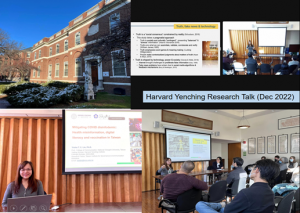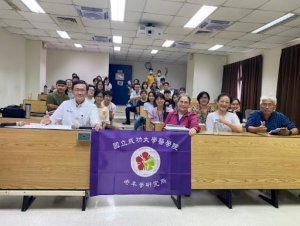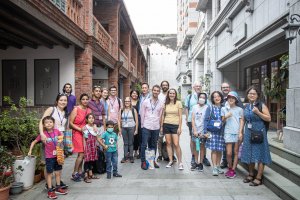I spent my time in Taiwan conducting archival research for my dissertation on the intellectual and bureaucratic development of the Chinese Ministry of Foreign Affairs from the Republican Period to the twilight of the Cold War. My project begins by looking at the education and training of a new generation of diplomats within the Kuomintang (KMT) party system and the Republican bureaucracy, particularly those who graduated from the Foreign Affairs Department (waijiao xi) of the KMT’s Central School of Governance (zhongyang zhengzhi xuexiao). I then follow those young bureaucrats as they entered the Ministry of Foreign Affairs in the 1930s and 1940s, deploying their newly acquired diplomatic skills and philosophies to transform the structure, functions, and orientation of the institution. Finally, I trace the rise of these individuals to positions of prominence within the two Chinese diplomatic systems, one in Beijing and the other in Taipei, during the early Cold War. Nearly half of the Foreign Affairs Department alumni stayed in Mainland China after 1949 and this network of KMT-trained diplomats exercised considerable influence on both sides of the Taiwan Straits throughout the 1950s, the 1960s, and the 1970s.
By tracing the long arc of these diplomats’ careers, I am hoping to illuminate not only their rise as a professionalized diplomatic class, but also the origins of the modern Chinese diplomatic information order, a term originally coined by C.A. Bayly in reference to the British Empire, but recently utilized to great effect in the Chinese context by Qing Historian Matthew Mosca. In the context of my project, I use it to refer to methods and institutions through which the ROC and PRC governments gather and interpret information while formulating foreign policy. The diplomats who were educated in the 1930s were active throughout the entirety of the Cold War and the institutional innovations that they precipitated—the creation of specific groups to focus on South American, Southeast Asian, and African Affairs, to give just one example—still shape Chinese foreign policy to this day. The change in information order, in other words, meant the crafting of a new lens through which Chinese decision makers saw the world.
Thus, this is a distinctly Taiwan-focused project, not just because the archival materials upon which it is based are all located in Taipei. The Republic of China (ROC) was a crucial—and critically understudied—diplomatic actor in the first decades of the Cold War. In addition to its participation in the high politics and geopolitical drama of the United Nations Security Council, the ROC maintained a global presence through its expansive network of embassies and consulates. Much of this global diplomatic infrastructure—both the consulates and the personnel who staffed them—had its origins in the late Republican transformations described above. This sprawling presence served twin purposes: collecting information and projecting a particular national image. Starting in the 1930s, the ROC government established consulates throughout the world to garner support among overseas Chinese, including communities with no ties of citizenship. It was those same populations and, indeed, those same sentiments of ethno-nationalist pride that the People’s Republic of China (PRC) mobilized after 1979 in pursuit of Foreign Direct Investment during the Reform Era.
In part, this project is motivated by a desire to address gaps in the existing literature on Chinese, Taiwanese, and Cold War history. China’s role in shaping postwar international history has been the subject of several recent studies and the scholars working on China’s international role during and after World War II have revised the previous orthodoxy that China was either too weak or too insular to participate in postwar global politics, showing that despite domestic crises, both the nationalist and the communist governments were actively engaged in global grand strategies. Yet, these projects rarely address the ROC’s global role after relocating to Taiwan in 1949. In the same way, scholars of PRC history have revived interest in the Republican Period (1911-1949) by emphasizing continuities across the 1949 revolution (contra the narrative of complete rupture promoted by the Chinese Communist Party), elements of Maoist culture and governance that are rooted in earlier trends. Yet, the ROC tends to disappear from these narratives after 1949 and the Republican Period is mined only for historical antecedents to post-revolutionary developments in the PRC. My project attempts to remedy this scholarly oversight, focusing on bifurcation after 1949 rather than solely on continuity. To this end, I track the political and institutional bifurcation that occurred after the revolution with former classmates and colleagues pursuing parallel careers from the two rival Chinese Ministries of Foreign Affairs.
Over the course of my time in Taiwan I have primarily worked in four archives while also taking advantage of the excellent library holdings at Taipei’s various academic institutions. The chronologically earliest section of my dissertation is based on materials that I gathered from the archival collection at National Chengchi University (NCCU), the successor institution to the Central Political Institute, my host university, and still the leading university for training ROC bureaucrats. This under-explored collection contains the personal papers of several key figures from this period such as Luo, Jialun, the school’s guiding academic figure throughout the 1930s, and Xu Mo, the first chair of the Foreign Affairs Department and later the first Chinese judge on the International Court of Justice. In addition to the papers of these prominent figures, the archive also includes the memoirs and oral histories of many lesser-known alumni as part of its “NCCUers” (zhengda ren) collection. Finally, the NCCU archive has a partnership with the Second Historical Archive in Nanjing, the main depository of Republican Era materials in the PRC, through which they share materials related to the Central School of Governance. The documents from Second Historical, no longer accessible in the PRC because of tightening controls around foreign researchers working in archives, are rich with general campus materials such as student publications, examinations, textbooks, and budgets.
Subsequent sections of the dissertation focus on the careers of these graduates and rely on research I conducted in Academia Sinica’s Institute of Modern History Archive, Academia Historica, and the KMT Party Archive. This includes chapters on the new ideas and expertise that were developed in the particular academic environment of a party school and then how those ideas and expertise were deployed when the Foreign Affairs Department graduates joined the government bureaucracy as young diplomats. In particular, I look at two concepts that became extremely prominent during the 1930s, both within the school community and in broader intellectual circles: “revolutionary diplomacy” (geming waijao) and “diplomatic administration” (waijiao xingzheng). The former, heavily influenced by Soviet diplomacy, held that China’s diplomatic efforts should no longer focus on currying favor with its imperial tormenters, but should rather be directed towards forging alliance with other newly independent countries or anticolonial movements. The latter applied the principles of scientific managerialism and administration to the practice of diplomacy, calling for an expansion and rationalization of China’s diplomatic infrastructure. As successive classes of new diplomats poured into the Ministry of Foreign Affairs, these ideas took on institutional forms with the creation of specific regional departments within the ministry and the prioritization of new foreign language skills. Finally, I explore the height of these diplomats’ careers during the Cold War in both the ROC and the PRC. I focus on the ROC’s projection of a global diplomatic presence from Taiwan through the consulate network mentioned above and participation in all manner of international commissions, organizations, and conferences. For the PRC side, I look at how Foreign Affairs Department graduates who stayed on the mainland helped shape the transition from “revolutionary diplomacy” to “people’s diplomacy” (renmin waijiao).
Over the course of my time in Taiwan, I have been fortunate to have the opportunity to learn from and engage with so many wonderful scholars who gave generously of their time in helping me develop my research questions or trace down particular primary sources. I am deeply indebted to the members of the NCCU history department who sponsored my application and welcomed me to campus, not only discussing my work with me on an individual basis, but also inviting me to speak in their classes and present at local conferences. The archivists at NCCU were unfailingly patient with me as I learned to use their system and familiarized myself with the collection’s holdings, always happy to point me in the right direction. I received similarly invaluable advice from the faculty and archival staff at Academia Sinica’s Institute of Modern History and the archivists at Academia Historica coached me through the complicated process of requesting that files protected under Taiwan’s personal privacy laws be declassified. My last and greatest debt of gratitude is to the staff and other research associates of Fulbright Taiwan, the former for having made it possible for me to arrive in Taiwan and conduct this research under the most unlikely of circumstances and the latter as companions throughout my time in Taiwan, both academically and otherwise. The Fulbright Taiwan community has been the backbone of my experience here and I am deeply appreciative of all the guidance and support I have received.







